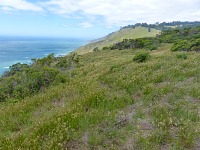 |
| Coast of Northern California. |
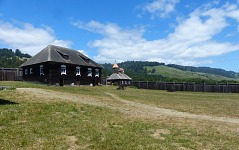 |
| Fort Ross. |
Thus we found ourselves on our way north, on this last May Saturday. Our plan included Fort Ross,
a historic Russian colony in Northern California, which is at least five hours of drive distant,
and which we can't visit just in the course of one day. Thanks to Lisa's competition in Petaluma,
we know a sushi place there, which allowed us to have a quick lunch without any long wandering
around the down town.
And to stretch our legs, we stopped for a while at Sonoma Coast Overlook, north of Bodega Bay.
There, we have spotted a very pretty snake near the restrooms. And then we rattled on and on
along the winding coastal road full of relaxed holiday drivers, until the unbelievable became
a fact and we had arrived to Fort Ross.
The fort was founded in 1812 by Ivan Kuskov, as directed by his supervisor Baranov, thus a
a governor of Russian America — that is, mostly Alaska. The Russians had originally
intended to grow food for Alaska in California, and supply Chinese markets with highly demanded
sea otter furs. They almost accomplished to exterminate the animals; also, northern parts of
California are not too suitable for agriculture, and since the year 1839 the Russians had signed
a contract to supply Alaska with the Hudson's Bay Company. In 1841, John Sutter has purchased
the fort, and moved much of its equipment to his own Fort Sutter in Sacramento Valley.
Since 1908, state of California owns the land surrounding Fort Ross, and the restored installation
can be visited as a historic landmark. Smack in the middle of California, a wooden
East-European settlement with a small Orthodox church and signs in Cyrillic alphabet, is a strange
apparition.
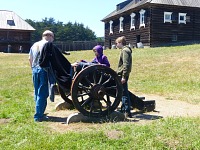 |
| At the gun. |
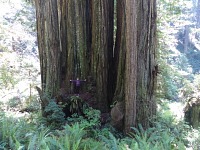 |
| Treesome — in reality it's all one tree. |
Our children had visited the fort back when they were toddlers, and now they showed interest in
defensive turrets (one has seven sides), original lodging quarters reminding of some hillbilly hut,
with chest and a brick oven, and stores with goods marked in Cyrillic alphabet.
Besides us, another group of Americans moved through the fort, and the rest of visitors were all
Russians — who were watching us with satisfaction as we tried to read markings on an old bell
to our kids, and even tolerated when Sid sang from a turret window a popular tune from an old
Russian fairytale movie. Then we attempted to quiz the Russian visitors for a translation of
proud signs "ПАТОКИ" on many barrels. We learned that it has something to do with honey,
but no present Russians could provide any accurate explanation (it's maltodextrin).
Then we had to choose — either an hour drive back on a winding road to a freeway to Eureka,
— or stay on the coastal highway and thus slalom our way to Eureka along the coast.
We reckoned that time-wise it would be a draw, and it probably was, but this exact tiresome
journeying on narrow roads is the reason we come to Fort Ross so infrequently. Even so, we barely
made it to dinner in Eureka, before the last Chinese place would close, and reached our hotel after
dark. It was interesting to notice how much difference a one day drive north makes. Night comes
around eight at our house, and there was still light in Eureka at nine. And similarly, dawn came
an hour sooner than we are used to.
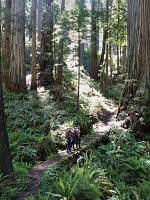 |
| We're standing on a redwood trunk that fell across a creek. |
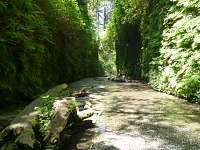 |
| A rare moment when no tourists are teeming in Fern Canyon. |
We wanted to devote Sunday to redwoods and rhododendrons, which should be blooming when spring
breaks into summer. But this year everything got delayed, and the only blooming rhododendron we
could find grew right in front of our hotel. Redwoods (coastal sequoias) did not disappoint, though,
and when we had eventually found a trail less beleaguered by tourists, we were able to enjoy the
majestic giants in quiet and privacy. By evening we navigated by memory to a brewery, which we
remembered from last time, and were rewarded by great beer and average food from a mobile food-stand
(the brewery makes only beer, not dinners).
On Monday we went to wade in Fern Canyon. When I spotted tourists sloshing back into the parking
lot after having emerged from the canyon, I briskly swapped my sneakers for flip-flops, and I was
glad of it. This early, they don't install little bridges in the creek yet, and one must really
wade in some spots. Sid and Tom had trekking boots and thus jumped and detoured around the meanders;
it was easy for me in my flip-flops, and for Lisa in wellies. It was warm and we did not mind little
splashing, especially since we had a long way home ahead of us.
You see, cold weather had ended with Memorial Day, and a heat wave rolled right in. Not too
horrible, but the jump from fifties to eighties was a bit too abrupt. Especially for animals —
Lisa's Icelandic pony mare Osp did not manage to shed all her winter hair. That was the apparent
reason for her to having collapsed on Friday afternoon. Osp never rolls, but on that afternoon she
went down in a round pen and rolled around about half an hour, not showing any tendency to get up,
which scared us. Then she ignored her evening hay, until it got much cooler. On subsequent warmer
days we had to go shower the ponies — after all, they are not used to heat in Iceland.
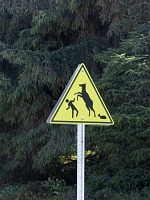 |
| Caution, elks will defend their young! |
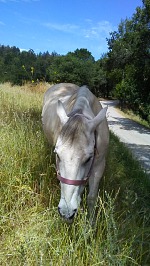 |
| Ned in horse heaven — belly-deep in grass. |
Ned was not likely to mind the heat, but my colleague Monique complained that he had not wanted to
enter woods much. Perhaps he got more cocky and started to try to arrange it so that he would just
laze around. I had always managed to get him on a trail, but I also invited a trainer to get him
back into proper mindset. It probably worked; Ned entered the woods without protesting. Just as I
was thinking how well we were doing, out of the forest rolled a tractor, which had been plowing
stripes of meadow (a local fire spreading prevention). We waited until the tractor passed us by,
and continued in our ride. Yet the tractor emerged onto the next meadow, which our trail would
circumnavigate, and so we did not get quite rid of it. And when we descended into a canyon along
a creek, we faced an excavator driving in the opposite direction. And a truck closed us in from
behind — while we could still hear the tractor busying itself through the slope above.
Fortunately, the excavator driver backed up to a turn-off, thus freeing at least one escape route
for us. All this made Ned very nervous, but he let it all happen with me on his back, for which he
should receive a medal. When we almost made it back to the stables, for a change we got spooked
by Jenny, who galloped from behind with two thoroughbreds, and by that time I was yelling like
crazy. It's already a stupid idea by itself, to gallop toward the stables (a horse looks forward
to get back home, and when you urge him on, he can get really carried away and stop paying attention
and take heed of the person on his back, easily scraping that person off by a gate and such).
Thus galloping into another walking horse is rude (for even an obedient horse follows a running herd
instinctively), and Ned had been stressed out that day quite enough already (running in the preserve
into a ranger with some cars, that is normal, but I really did not expect a whole pack of them, with
an excavator and a tractor). One could see that Ned was very close to getting truly spooked.
In the end all was well, we arrived at the stables both whole and together, and I relaxed.
Craig was scheduled to pick Ned up on the following day, and the last thing I needed, was
a bad experience before our separation.
Like every year, this time again people were asking if I minded that Ned was going away, and if
I would miss him and so on — and like every year, I tried to explain that I was happy that
Ned had a place to go for the summer break — that he would be in the mountains and not
amidst our hot weather, that he would be busy working a job he knows and likes, and that he would be
with people who had trained him to be this awesome horse (this year I did not use a bit for him,
we ride with just a sidepull) and that during the break, when kids are out of school, I can't reserve
a few hours every day to be with my horse. Still, when Craig was driving away, Ned neighed unhappily
in the trailer, making it indeed difficult for me.
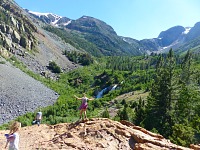 |
| Lundy Canyon. |
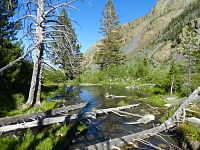 |
| A portion of a beaver dam. |
Children's summer break had actually started — and though I always look forward to all the
school stresses and chores fading away, I always received some new chores — above all, having
to pull pubescents away from smartphones and computers, and engage them in another — any other
— activity. Luckily they still find fun in playing in the swimming pool, and we still have our
goats, who need outing daily. But now that both Tom and Lisa attend home/virtual school, they spend
a lot of time together, and get cabin fever. Hence I began taking them to our goats one at the
time. It's also useful in that I get a moment with only one of them, making space for a private
chat. It also means that while they can take turns in resting, I keep setting out all the time,
with one or another in tow, and don't get much of a "break" myself.
Summer is the apex of vaulting season, and June contained two planned competitions; fortunately,
one of them got canceled. But then in July, regionals were being closely followed by national
championships, and Lisa did not want to miss any practices. Consequently, we stayed at home a lot.
Then I went down with some illness at the start of the summer break, and for two consecutive
weekends the family had an out-of-order mother, who refused to function. Before we got re-oriented
ourselves, July had arrived, and Independence Day celebrations fell on Wednesday. We had not planned
anything — we had given up on friends, did not feel like signing up for any organized events,
and so we just let it all work itself out. Iztok and his family reached out about wishing to be
in Bridgeport for the Fourth, and would we like to join them? That was great, and we promised to
meet them in the morning of July 4 at our usual camping spot — they had reserved a hotel room,
but were happy to spend the morning with us in the woods, catching lizards into grass snares
and building a bridge across an icy mountain stream, and with general running around, done mostly
by our children and their six-years-old Anja, so we adults could sometimes sit down and talk.
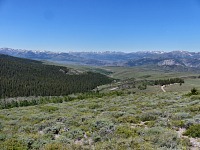 |
| A view of eastern slopes of Sierra Nevada. |
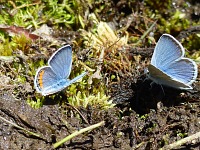 |
| Blue butterflies. |
We improvised a lunch at our campsite, and then proceeded to check out Lundy Lake. It has been years
since we last visited, for either the whole valley was flooded, or it still contained much snow, or
we simply went somewhere else. We did not strive to reach any athletic
goats goal this time either,
but it's a pretty hike, although we stopped after reaching a beaver dam lake — the rodents
had dammed the valley, and over time most trees growing from this newly formed lake had died and
fallen, forming natural bridges and islands, over which one can jump and traverse, and splash in
the crystal clear water.
Sufficiently outed we descended upon Nellie's Deli for dinner, where we got joined by Nejedlí's.
We had accidentally stumbled upon them in Bridgeport earlier that day, as they were returning from
their vacation trip to Utah, and they, too, remembered desert fireworks. Thus my strongest
(and most absurd) experience from the show was Sid, Petr and Iztok, amongst a crowd of local
cowboys, arguing about benefits and pitfalls of various programming languages. On the other hand
— we truly did not hope to celebrate Independence Day not with one, but two friendly families,
— and the course of events had pleasantly surprised us.
I had arranged with Craig to let me join a riding group on Thursday. Lisa was worried that she would
not endure it with her back; Tom and Sid don't care much for horses, and thus I ventured on the trip
to the waterfalls without the rest of my family. Surprisingly enough, I was issued Ned
— I usually ride on other horses there. Ned would normally function as a lead horse
— he's dominant and other horses follow and obey him; plus he's a responsible horse, and his
rider doesn't need to take care of him, and can instead focus on clients and problems with
the trail. Ned was watching me very sourly upon my arrival, but I had the impression that he got
noticeably happier when he discovered he would ride with me. Perhaps he knows I am old and lazy,
and he wouldn't have to work hard with me. He got even happier at the turn-off to the waterfalls
— most people get off their horses there and hike the rest of the way — and horses
get a rest.
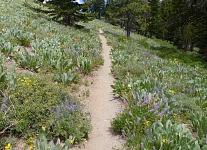 |
| Everything's in bloom. |
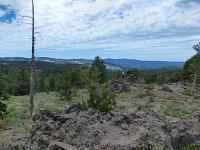 |
| Carson Spur. |
Meanwhile, Sid and the kids drove over to our old campsite at Cottonwood Creek to check it out.
For some reason, that spot is now quite abandoned; perhaps over the years, when thunderstorms and
snow-melt tore down much of the road, a lot of people got discouraged. After all, we, too, had
stopped going there, after we could not reach it for two years in a row, and began to visit the pack
station more, camping near it, and civilization in general.
We solved the question, which way to go back, by taking a detour through Carson Pass. One worry
of ours was that there would be traffic jams, but I also wanted to check out the Carson Spur
overlook, where Sid and Tom hiked in winter. It surprised me with a deluge of flowers on a
southern slope at almost ten thousand feet. It seemed as if nature had skipped spring, and rushed
full steam ahead right into summer.


















